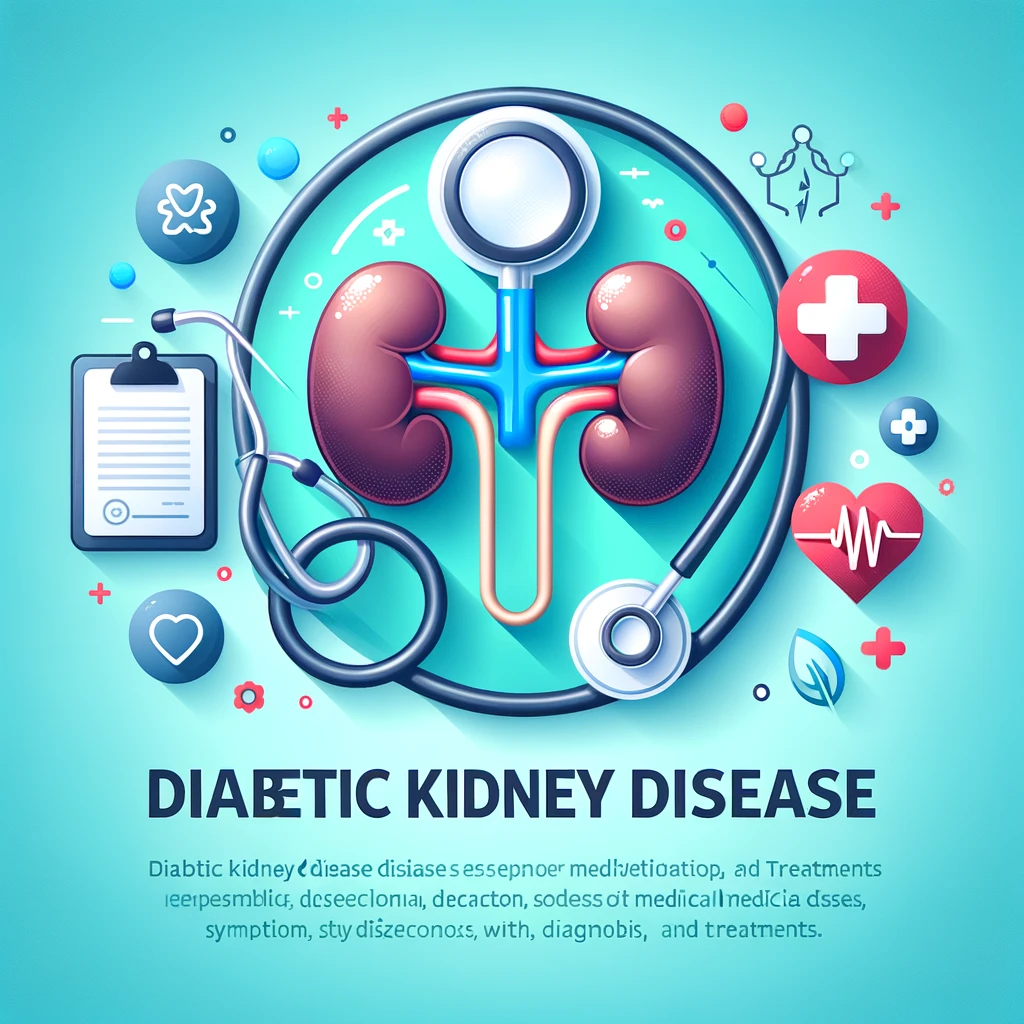
Diabetic kidney disease, also known as diabetic nephropathy, is a serious complication of diabetes that affects the kidneys’ ability to filter waste from the blood. Understanding this condition is crucial for managing diabetes effectively and maintaining overall health.
What is Diabetic Kidney Disease?
Diabetic kidney disease is a type of kidney damage that occurs in people with diabetes. Over time, high blood sugar levels can damage the kidneys, leading to a gradual decline in their function. This condition is one of the leading causes of kidney failure worldwide.
Causes of Diabetic Kidney Disease
High Blood Sugar Levels
The primary cause of diabetic kidney disease is prolonged exposure to high blood sugar levels. Excess glucose in the blood can damage the tiny blood vessels in the kidneys, impairing their ability to filter waste effectively.
High Blood Pressure
High blood pressure is another significant factor that contributes to kidney damage. The increased pressure can strain the kidneys, exacerbating the damage caused by high blood sugar levels.
Genetic Factors
Genetics also play a role in the development of diabetic kidney disease. Individuals with a family history of kidney disease or diabetes are at a higher risk of developing the condition.
Symptoms of Diabetic Kidney Disease
Early Signs
In the early stages, diabetic kidney disease may not present any noticeable symptoms. However, some early indicators include increased protein in the urine (microalbuminuria) and slight increases in blood pressure.
Advanced Symptoms
As the disease progresses, symptoms may become more apparent and severe, including:
- Swelling in the hands, feet, and face
- Fatigue
- Nausea and vomiting
- Loss of appetite
- Itching
- Shortness of breath
Stages of Diabetic Kidney Disease
Stage 1: Hyperfiltration
Increased kidney function as the body tries to compensate for the damage.
Stage 2: Microalbuminuria
Small amounts of protein leak into the urine, indicating early kidney damage.
Stage 3: Macroalbuminuria
Larger amounts of protein are found in the urine and kidney function begins to decline.
Stage 4: Severe Reduction in Kidney Function
Significant loss of kidney function, leading to noticeable symptoms and increased health risks.
Stage 5: Kidney Failure
Complete kidney failure, requiring dialysis or a kidney transplant for survival.
Diagnosis of Diabetic Kidney Disease
Blood Tests
Blood tests can measure the levels of waste products like creatinine and urea in the blood, which indicate kidney function.
Urine Tests
Urine tests detect the presence of protein, a sign of kidney damage.
Imaging Tests
Imaging tests such as ultrasound or CT scans can provide detailed images of the kidneys to identify structural abnormalities.
Risk Factors for Diabetic Kidney Disease
Uncontrolled Diabetes
Poorly managed diabetes significantly increases the risk of developing kidney disease.
High Blood Pressure
Elevated blood pressure levels can accelerate kidney damage in diabetics.
Smoking
Smoking can worsen kidney damage by constricting blood vessels and reducing blood flow to the kidneys.
Obesity
Being overweight increases the strain on the kidneys and can lead to further complications.
Preventive Measures
Blood Sugar Control
Maintaining optimal blood sugar levels is crucial in preventing diabetic kidney disease. Regular monitoring and adherence to treatment plans can help manage blood sugar effectively.
Blood Pressure Management
Keeping blood pressure within a healthy range can reduce the risk of kidney damage. Medications and lifestyle changes are essential for blood pressure control.
Healthy Lifestyle Choices
Adopting a healthy diet, engaging in regular physical activity and avoiding smoking can significantly reduce the risk of diabetic kidney disease.
Treatment Options
Medications
Various medications can help manage the symptoms and slow the progression of diabetic kidney disease.
Dialysis
In advanced stages, dialysis may be necessary to filter waste from the blood when the kidneys can no longer perform this function.
Kidney Transplant
A kidney transplant may be considered for patients with end-stage kidney disease. This involves replacing the damaged kidney with a healthy one from a donor.
Medications for Diabetic Kidney Disease
ACE Inhibitors
These medications help lower blood pressure and reduce protein leakage into the urine, protecting the kidneys.
ARBs
Angiotensin II receptor blockers (ARBs) work similarly to ACE inhibitors and are used to manage blood pressure and reduce kidney damage.
SGLT2 Inhibitors
These newer medications help control blood sugar levels and have been shown to have protective effects on the kidneys.
Diet and Lifestyle Changes
Dietary Recommendations
A balanced diet low in sodium, refined sugars, and saturated fats can help manage diabetes and protect the kidneys. Increasing intake of fruits, vegetables and whole grains is beneficial.
Exercise Routines
Regular physical activity can help manage blood sugar levels, reduce blood pressure and maintain a healthy weight, all of which are crucial for kidney health.
Weight Management
Maintaining a healthy weight can reduce the risk of developing diabetic kidney disease and other complications associated with diabetes.
Living with Diabetic Kidney Disease
Coping Strategies
Living with diabetic kidney disease can be challenging, but various coping strategies, such as joining support groups and seeking counseling, can help manage the emotional and psychological aspects.
Support Systems
Having a strong support system of family, friends and healthcare professionals is essential for managing the condition and maintaining a good quality of life.
Innovative Research and Future Treatments
Advances in Medical Research
Ongoing research is continually uncovering new treatments and interventions for diabetic kidney disease. These advances hold promise for more effective management and potentially curative therapies.
Potential Future Therapies
Future therapies may include regenerative medicine techniques, advanced pharmaceuticals and personalized treatment plans based on genetic profiling.
Conclusion
Diabetic kidney disease is a serious condition, but with proper management, early diagnosis, and a proactive approach to treatment, individuals can lead healthy and active lives. Staying informed, making healthy lifestyle choices, and working closely with healthcare providers are key to preventing and managing this condition.
FAQs
What are the early symptoms of diabetic kidney disease?
Early symptoms include increased protein in the urine, slight increases in blood pressure and subtle changes in kidney function tests.
How can diabetic kidney disease be prevented?
Maintaining optimal blood sugar levels, managing blood pressure, adopting a healthy lifestyle and regular check-ups can help prevent diabetic kidney disease.
Is diabetic kidney disease reversible?
While the damage caused by diabetic kidney disease is often irreversible, early detection and proper management can slow its progression and improve quality of life.
What dietary changes can help manage diabetic kidney disease?
A diet low in sodium, refined sugars and saturated fats, and high in fruits, vegetables and whole grains can help manage the condition.
What is the role of dialysis in diabetic kidney disease?
Dialysis is used in advanced stages to filter waste from the blood when the kidneys can no longer perform this function effectively.



